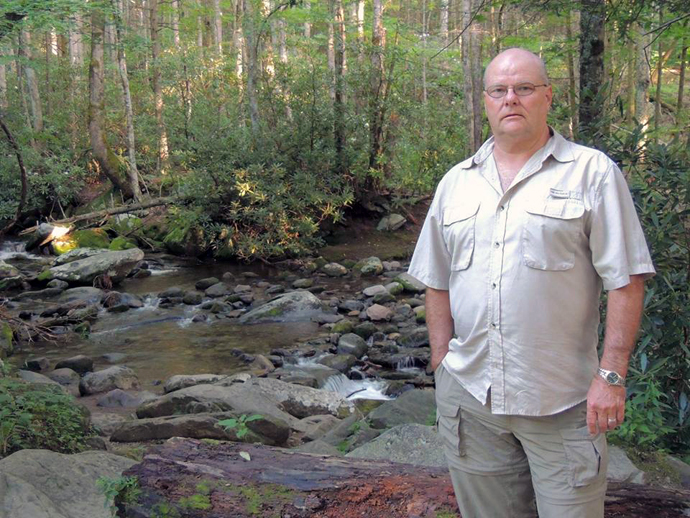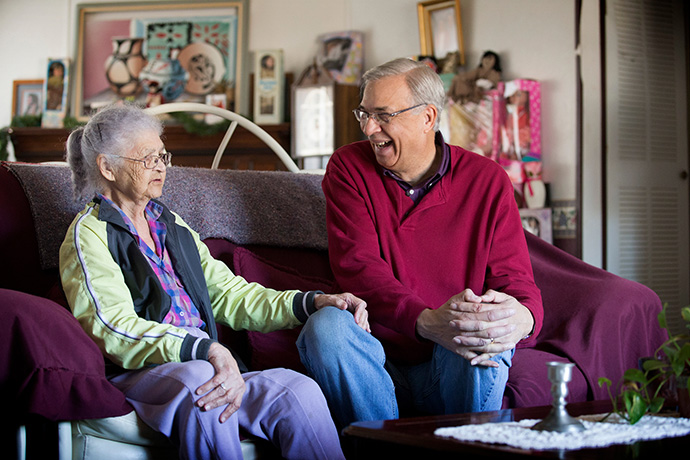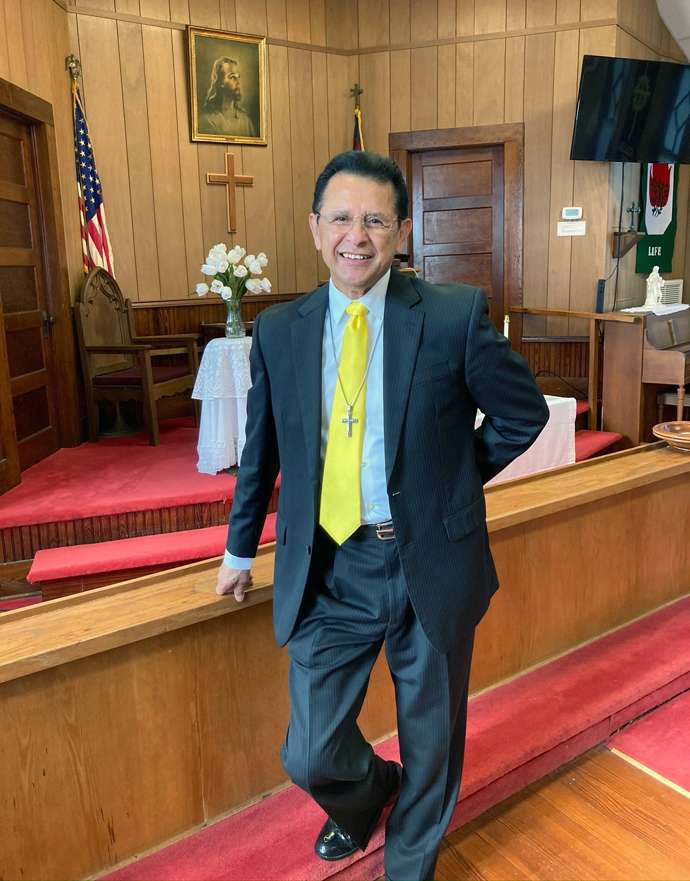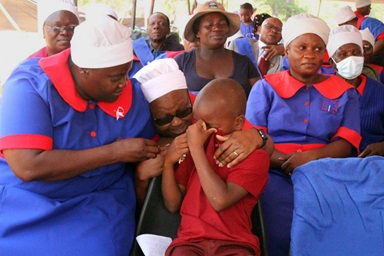Teddy Brawner didn’t sound so good, but he wanted to tell anyone still skeptical that the coronavirus is serious business.
The 65-year-old retiree and member of Gleason First United Methodist Church in West Tennessee is one of 14 members of the church who caught the virus. He has no idea how he got it.
“I can talk a little bit, but I don’t have much wind,” he said. “I’ve still got the pneumonia.”
Brawner fought the virus at home for a week before going to the hospital. He was moved to a Nashville, Tennessee, hospital, where he spent a lonely 13 days in intensive care. No visitors allowed. His wife got the virus and was hospitalized back home in West Tennessee.
“I’ve always been kind of stubborn and thought I could knock anything,” he said. “I was pretty healthy and I just knew, just knew, I would get over this. But I just didn’t.”
Brawner said he is on the mend, but he lacks strength and is short-winded.
“I’m telling you, if you get it, it’s some serious stuff,” he said.

Teddy Brawner in the Great Smoky Mountains National Park in 2020. He is recovering at home from the coronavirus after spending 13 days in intensive care. Photo courtesy of the Rev. J. Alan Trull.
United Methodists have their share of coronavirus victims, and some didn’t get the happy ending Brawner appears to be working toward.
Gary Locklear, who died Sept. 10 from COVID-19 at age 72, retired three times but always rose to the occasion when called back into service in the North Carolina Conference, said his widow, Panthia Locklear.
“He was probably on all of the positions for the administrative council,” Panthia Locklear said. “He taught Sunday school for over 50 years; started when he was in high school.”
A lifelong member of Sandy Plains United Methodist Church in Pembroke, North Carolina, Gary Locklear did mission work in South Carolina, Alaska, Guatemala, Russia and Bolivia. In Bolivia, he laid brick for a rural health clinic that now serves 50,000 people. For nearly a decade, he served as lay leader for the North Carolina Conference. He also led disaster relief efforts after Hurricane Matthew and Hurricane Florence.
Steve Taylor, director of connectional ministries for the conference and a close friend, said Locklear had “as deep of a Christian faith as I’ve ever known in my life.”
“If you looked to the life of Jesus and you don’t know exactly how to pattern your life after Jesus’ life as you look at it in Scripture, if you patterned your life after Gary’s life, that would be close enough,” Taylor said.
The Locklears are members of the Lumbee Tribe of North Carolina, the state’s largest tribe and the ninth-largest non-federally recognized Native American tribe in the U.S.
“One of the central, absolutely most important characteristics of Gary’s life was his heritage as a Lumbee person,” Taylor said. “Because Gary was part of the tribe and because so much of the Gospel story is spoken from the underside, from the perspective of marginalized people, Gary really understood the Gospel in such profound ways,” Taylor said. “And he just lived that out.”

United Methodist Home Missioner Gary Locklear visits with Strawdie Locklear, then 93, (no relation) at her home in Pembroke, N.C., in 2014. Gary was her teacher in the Senior Adult Sunday school class at Sandy Plains United Methodist Church in Pembroke for 30 years. Gary Locklear died Sept. 10 from the coronavirus. File photo by Mike DuBose, UM News.
Villegas, a Vietnam War veteran, grew up Catholic and joined The United Methodist Church much later in life, with an Emmaus Walk experience helping deepen his Christian commitment.
He served as a part-time licensed local pastor at St. John United Methodist Church in Rio Grande City, and this summer began as a supply pastor at Skidmore United Methodist Church, in Skidmore.
His brother said Villegas was in excellent physical condition and had no known underlying conditions before testing positive for COVID-19. “He thought he was going to get through this,” Thomas said.
Among those mourning Villegas is Noe Castillo, chief of the Rio Grande City Police Department. He said Villegas befriended him and led him back to church after an absence of many years.
“He was always praying for me,” said Castillo, who has had a tree planted in Villegas’ memory. “I thank God that he came into my life.”

The Rev. George Emerson Villegas spent about 40 days in the hospital before dying of COVID-19 on Sept. 20 at age 74. Photo courtesy of Chris Thomas.
“We have been sheltering in place,” Ken Smith said. “I wear a mask every time I go places. … We were very, very careful, and it was one slip-up.”
Ken Smith, pastor of South Fulton United Methodist Church in West Tennessee, suffered a two-week tension headache, some digestion issues and fatigue.
“It felt like I had a band around my head, like you wore a hat that was too tight,” he said.
Layne Smith had it worse.
“The only thing she didn’t have is going to the hospital with pneumonia and dying,” Ken Smith said.
She suffered “miserable” body aches, breathing issues, digestive problems and still hasn’t recovered her senses of taste and smell, Smith said.
Ken Smith has spoken to his small, elderly congregation “many times” about the dangers of the coronavirus. In rural Tennessee, he said some people believe the coronavirus is “a political football that will be over and done with by election day (Nov. 3).
“It’s real. … It’s vey, very difficult to make people understand until they actually get this, that they don’t want it. In some cases, that’s way too late,” he said.
Subscribe to our
e-newsletter
Like what you're reading and want to see more? Sign up for our free daily and weekly digests of important news and events in the life of The United Methodist Church.
“I did not believe in the existence of this disease, but when I was affected by it, I understood the need to educate others to fight against this pandemic,” Abel said.
Abel spent two months in a COVID-19 treatment center.
He and other United Methodist survivors are sharing their stories on community radio programs to educate others and reinforce health measures to stop the spread of the coronavirus.
“I have become an ambassador to raise awareness (to help) other people fight effectively,” he said.
The Rev. Trish Archer spent her 60th birthday in a hospital emergency room because she was having difficulty breathing. The deacon picked up COVID-19 from her husband, Dr. Noah Archer, a pediatrician in Wilmington, North Carolina.
“It was horrible,” she said. “We got sick on a Friday and we had symptoms for about a month.”
Both contracted pneumonia and Trish got cardiomyopathy, which makes it hard for the heart to pump blood to other parts of the body. She’s back at work coaching pastors on leadership development, but still battling fatigue.
In her online journal, she writes about a medical assistant who referred her to Isaiah 53:5 (“By His stripes you are healed”). “It was like God speaking directly into my soul through her,” she wrote.
The Rev. Mark Templeton’s brush with the coronavirus at least came with a silver lining.
Exposed during a family event, Templeton quarantined even though he never contracted COVID-19. Unfortunately, the quarantine coincided with his Aug. 21 ordination ceremony, the end of an 11-year process that started when he left auto mechanics for the ministry and returned to college at age 38 to earn his bachelor’s degree.
“So here I am as healthy as all get-out, watching my cohorts be ordained on the computer livestreamed,” Templeton said.
The good news is how the arrangements came together for his ordination on Oct. 4.
He was ordained in the sanctuary at Lafayette (Tennessee) United Methodist Church, where is currently appointed as pastor. He was saved there during a youth revival, married there 12 years later and preached his first sermon away from his home church there.
“I don’t know too many people who get to be ordained on the spot they were first saved,” Templeton said.
Patterson is a UM News reporter in Nashville, Tennessee. Contact him at 615-742-5470 or newsdesk@umcom.org. Philippe Kituka Lolonga and Sam Hodges contributed to this story. To read more United Methodist news, subscribe to the free Daily or Weekly Digests.
Like what you're reading? Support the ministry of UM News! Your support ensures the latest denominational news, dynamic stories and informative articles will continue to connect our global community. Make a tax-deductible donation at ResourceUMC.org/GiveUMCom.




